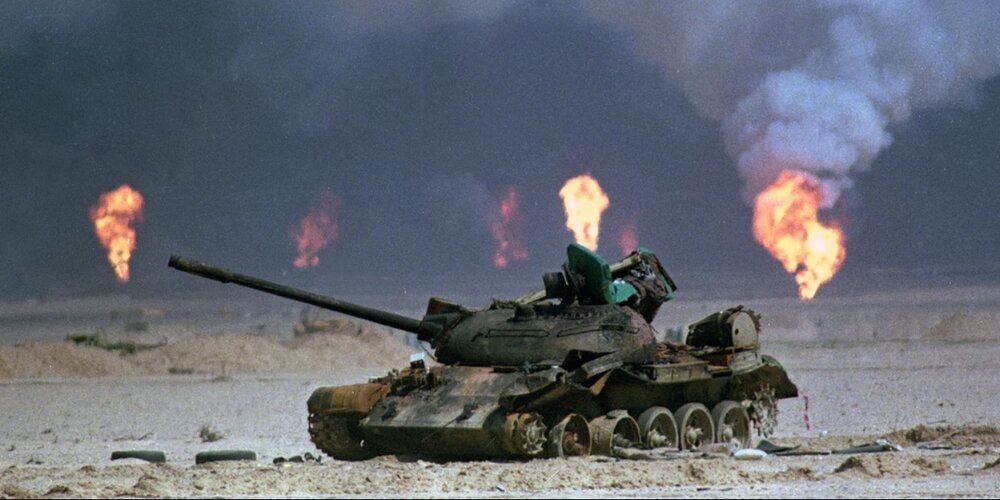The Gulf War, also known as the First Gulf War, was a conflict that took place from August 2nd, 1990 to February 28th, 1991, primarily in the Persian Gulf. It was fought between Iraq, led by Saddam Hussein, and a coalition of 34 countries, led by the United States, which sought to force Iraq to withdraw from Kuwait, which it had invaded and occupied on August 2nd, 1990. The conflict lasted for a total of seven months and resulted in a decisive victory for the coalition forces, with Iraq being forced to withdraw from Kuwait.
Causes of the Gulf War
The primary cause of the Gulf War was Iraq’s invasion and occupation of Kuwait. This was motivated by a number of factors, including Iraq’s desire to control Kuwait’s vast oil reserves and to secure access to the Persian Gulf. Additionally, Iraq had long-standing territorial disputes with Kuwait, which it claimed had been stealing oil from the Rumaila oil field, which lay on the border between the two countries. Saddam Hussein also sought to expand his power and influence in the region and saw the invasion of Kuwait as an opportunity to do so.
The United States Response
The United States responded to the invasion of Kuwait by leading a coalition of 34 countries in a military operation to force Iraq to withdraw from Kuwait. The United States had a number of motivations for its involvement in the conflict, including its desire to protect its economic interests in the region and its commitment to the stability of the Persian Gulf. Additionally, the United States saw the conflict as an opportunity to demonstrate its military power and to reassert its leadership role in the world.
International Diplomacy and Sanctions
In the months leading up to the war, the United States and its allies sought to resolve the conflict through diplomatic means. This included efforts to negotiate with Saddam Hussein and to impose economic sanctions on Iraq in an effort to pressure it to withdraw from Kuwait. These efforts were largely unsuccessful, and Iraq refused to withdraw from Kuwait, leading to the coalition’s decision to use military force.
The Air Campaign
The Gulf War began with a massive air campaign, which was conducted by the coalition forces. The air campaign lasted for 42 days and was aimed at destroying Iraq’s military capabilities and infrastructure. This included targeting Iraq’s air defense systems, communication networks, and military installations. The air campaign was highly effective, and by the end of it, Iraq’s military capabilities had been severely degraded.
The Ground Campaign
Following the air campaign, coalition forces launched a ground campaign to liberate Kuwait and to force Iraq to withdraw from the country. The ground campaign lasted for just 100 hours and was characterized by a rapid advance into Kuwait and Iraq. The coalition forces encountered relatively little resistance, and by the end of the campaign, Kuwait had been liberated and Iraq had been forced to withdraw from the country.
The Aftermath of the Gulf War
The Gulf War had far-reaching consequences for the region and the world. In the immediate aftermath of the conflict, the United Nations imposed strict economic sanctions on Iraq, which were aimed at crippling the country’s ability to develop weapons of mass destruction. Additionally, the United States established a military presence in the region, which it has maintained to this day. The Gulf War also led to a greater understanding of the dangers posed by weapons of mass destruction and helped to galvanize international efforts to prevent their spread.
The Gulf War was a major conflict that took place in the Persian Gulf in the early 1990s. It was fought between Iraq and a coalition of 34 countries, led by the United States, and resulted in a decisive victory for the coalition forces. The conflict had far-reaching consequences for the region and the world, including the imposition of strengthening international efforts to prevent the spread of weapons of mass destruction. The Gulf War demonstrated the importance of international cooperation in responding to global security threats and the need for collective action to ensure stability and security in the world.
Conclusion
The Gulf War was a significant event in modern history and continues to have an impact on the region and the world to this day. Its lessons and consequences continue to shape international relations and the global security landscape, reminding us of the importance of diplomacy and the need to address security threats through peaceful means.
READ MORE
- Black Friday: The Busiest Shopping Day of the Year
- The Magic of Christmas: A Story of Joy, Love, and Giving
- Breast Cancer: Understanding the Disease and Finding a Cure
- World Cancer Day: Raising Awareness and Finding a Cure
- The Significance and Celebrations of Holika Dahan in India

